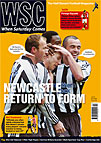 Even if League Two strugglers Cambridge United are saved by a supporters’ trust they could be in the Conference next season, to Graham Dunbar 's chagrin
Even if League Two strugglers Cambridge United are saved by a supporters’ trust they could be in the Conference next season, to Graham Dunbar 's chagrin
In his working life, as director of the prime minister’s media strategy, Godric Smith can sleep easy, all but sure that he will be on the winning side at the expected general election on May 5. His sporting life offers less certainty. As a supporter of Cambridge United, he cannot be sure he will have a club to watch after the League Two season ends two days later.
Smith, a main-stand season-ticket-holder, is one of the driving forces behind Cambridge Fans United (CFU), the supporters’ trust that aims to stop the Abbey Stadium from falling to housing developers and the club slipping into the clutches of an unholy trinity of relegation, administration and liquidation. In contrast to the shambles on the pitch this season, CFU has offered ambitious yet realistic alternatives to the passive fatalism in the boardroom. Oh, and hard cash, too.
But the deadlines have become tighter since the six-acre stadium site was sold last November to Bideawhile – a company co-owned by John Howard, a club director for 15 years – which leased back the ground for £200,000 a year. The £1.9 million sale cleared all debts, paying off a bridging loan, mortgage, bank overdraft and commercial loan while leaving the board £500,000 in working capital. In January, CFU replied by launching a 30-page prospectus to lure investors to a plan to buy the ground and make it a community centre, regenerating one of the few deprived areas of a wealthy city that hardly needs a toiling football team to raise its global profile. Smith, who grew up in Cambridge and lives there again, said: “The focus of what we’re doing is to stay up in League Two and create a not-for-profit community stadium trust.”
The following week, the board announced the working capital was gone and £300,000 was needed by March 1, with a further £300,000 by the end of the season. At this point chairman Gary Harwood did the decent thing and resigned. Harwood staked his three-year stint in charge to a policy of candid openness about club finances, yet was never trusted after striker Dave Kitson was hawked off to Reading for £150,000 on Boxing Day 2003. Coming two days after fans had delivered £100,000 to pay off a previous bridging loan, the sudden sale was seen as rank betrayal.
The collection buckets came out again at the home game against Macclesfield Town on February 12 and the first few thousand pounds were banked. Unlike the points, as the Us dominated, failed to capitalise and gave up a tame winning goal. The game typified the managerial reign of Steve Thompson, brought in on a firefighting mission after the well intentioned but naive experiment with Hervé Renard, protégé of Claude Le Roy, the former Cameroon coach and now Cambridge’s absentee director of football.
A 1-0 victory over Cheltenham on February 22 was the first for Thompson and the first in the league for three months but, just like the Macclesfield game, was watched by fewer than 3,000 people.
As ever, CFU’s vision and hard work are Plan B as far as the board are concerned. First priority is being given to an offer from Johnny Hon, another director, of £500,000 for a controlling stake and a marketing strategy in China. Whether the world’s hottest economy is ready for Conference football remains to be seen. How Cambridge United can survive relegation and an instant loss of £800,000 in revenue is just as big a mystery.
Adding to the intrigue is cash-strapped Cambridge City’s refusal to fade out of the play-off picture in Conference South, raising the prospect of local derbies in the Nationwide Conference next season and the spectres of ground-sharing and merger.
While Alastair Campbell can cling to faint hopes of seeing Burnley reach an FA Cup final, the man he groomed to succeed him briefing the media in Downing Street – and who gave evidence to the Hutton Inquiry – might have his toughest job ahead of him. “There are no guarantees we will do this and succeed,” Smith says of the stadium campaign. “The one guarantee every football club does have is that at three o’clock on Saturday they will kick off. And come next season that might not apply to Cambridge.”
From WSC 218 April 2005. What was happening this month